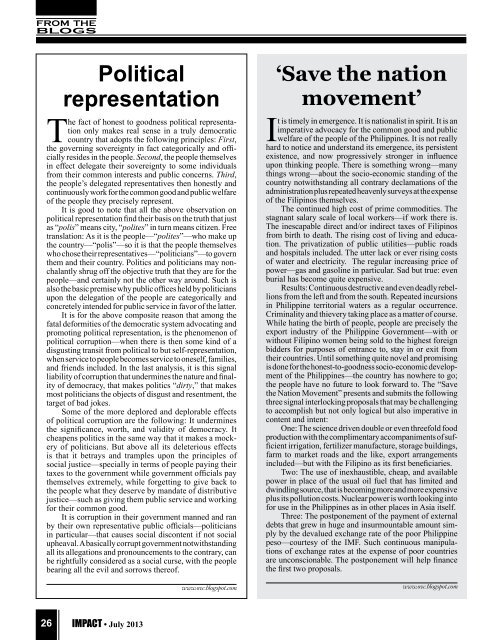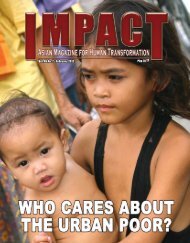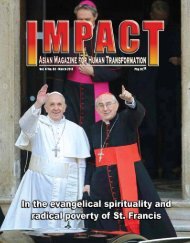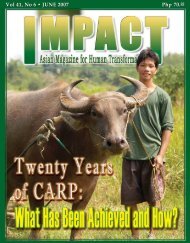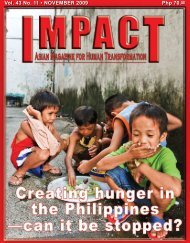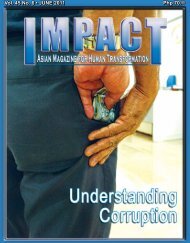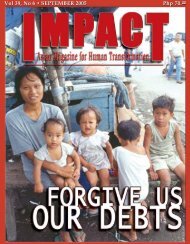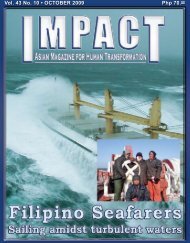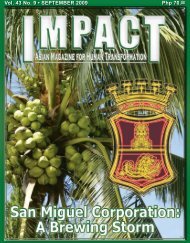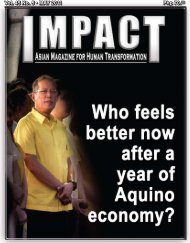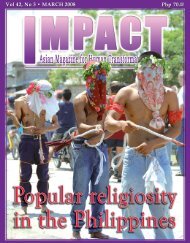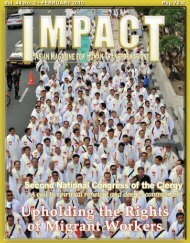Php 70.00 Vol. 47 No. 07 • July 2013 - IMPACT Magazine Online!
Php 70.00 Vol. 47 No. 07 • July 2013 - IMPACT Magazine Online!
Php 70.00 Vol. 47 No. 07 • July 2013 - IMPACT Magazine Online!
Create successful ePaper yourself
Turn your PDF publications into a flip-book with our unique Google optimized e-Paper software.
FROM THE<br />
BLOGS<br />
Political<br />
representation<br />
The fact of honest to goodness political representation<br />
only makes real sense in a truly democratic<br />
country that adopts the following principles: First,<br />
the governing sovereignty in fact categorically and officially<br />
resides in the people. Second, the people themselves<br />
in effect delegate their sovereignty to some individuals<br />
from their common interests and public concerns. Third,<br />
the people’s delegated representatives then honestly and<br />
continuously work for the common good and public welfare<br />
of the people they precisely represent.<br />
It is good to note that all the above observation on<br />
political representation find their basis on the truth that just<br />
as “polis” means city, “polites” in turn means citizen. Free<br />
translation: As it is the people—“polites”—who make up<br />
the country—“polis”—so it is that the people themselves<br />
who chose their representatives—“politicians”—to govern<br />
them and their country. Politics and politicians may nonchalantly<br />
shrug off the objective truth that they are for the<br />
people—and certainly not the other way around. Such is<br />
also the basic premise why public offices held by politicians<br />
upon the delegation of the people are categorically and<br />
concretely intended for public service in favor of the latter.<br />
It is for the above composite reason that among the<br />
fatal deformities of the democratic system advocating and<br />
promoting political representation, is the phenomenon of<br />
political corruption—when there is then some kind of a<br />
disgusting transit from political to but self-representation,<br />
when service to people becomes service to oneself, families,<br />
and friends included. In the last analysis, it is this signal<br />
liability of corruption that undermines the nature and finality<br />
of democracy, that makes politics “dirty,” that makes<br />
most politicians the objects of disgust and resentment, the<br />
target of bad jokes.<br />
Some of the more deplored and deplorable effects<br />
of political corruption are the following: It undermines<br />
the significance, worth, and validity of democracy. It<br />
cheapens politics in the same way that it makes a mockery<br />
of politicians. But above all its deleterious effects<br />
is that it betrays and tramples upon the principles of<br />
social justice—specially in terms of people paying their<br />
taxes to the government while government officials pay<br />
themselves extremely, while forgetting to give back to<br />
the people what they deserve by mandate of distributive<br />
justice—such as giving them public service and working<br />
for their common good.<br />
It is corruption in their government manned and ran<br />
by their own representative public officials—politicians<br />
in particular—that causes social discontent if not social<br />
upheaval. A basically corrupt government notwithstanding<br />
all its allegations and pronouncements to the contrary, can<br />
be rightfully considered as a social curse, with the people<br />
bearing all the evil and sorrows thereof.<br />
www.ovc.blogspot.com<br />
‘Save the nation<br />
movement’<br />
It is timely in emergence. It is nationalist in spirit. It is an<br />
imperative advocacy for the common good and public<br />
welfare of the people of the Philippines. It is not really<br />
hard to notice and understand its emergence, its persistent<br />
existence, and now progressively stronger in influence<br />
upon thinking people. There is something wrong—many<br />
things wrong—about the socio-economic standing of the<br />
country notwithstanding all contrary declamations of the<br />
administration plus repeated heavenly surveys at the expense<br />
of the Filipinos themselves.<br />
The continued high cost of prime commodities. The<br />
stagnant salary scale of local workers—if work there is.<br />
The inescapable direct and/or indirect taxes of Filipinos<br />
from birth to death. The rising cost of living and education.<br />
The privatization of public utilities—public roads<br />
and hospitals included. The utter lack or ever rising costs<br />
of water and electricity. The regular increasing price of<br />
power—gas and gasoline in particular. Sad but true: even<br />
burial has become quite expensive.<br />
Results: Continuous destructive and even deadly rebellions<br />
from the left and from the south. Repeated incursions<br />
in Philippine territorial waters as a regular occurrence.<br />
Criminality and thievery taking place as a matter of course.<br />
While hating the birth of people, people are precisely the<br />
export industry of the Philippine Government—with or<br />
without Filipino women being sold to the highest foreign<br />
bidders for purposes of entrance to, stay in or exit from<br />
their countries. Until something quite novel and promising<br />
is done for the honest-to-goodness socio-economic development<br />
of the Philippines—the country has nowhere to go;<br />
the people have no future to look forward to. The “Save<br />
the Nation Movement” presents and submits the following<br />
three signal interlocking proposals that may be challenging<br />
to accomplish but not only logical but also imperative in<br />
content and intent:<br />
One: The science driven double or even threefold food<br />
production with the complimentary accompaniments of sufficient<br />
irrigation, fertilizer manufacture, storage buildings,<br />
farm to market roads and the like, export arrangements<br />
included—but with the Filipino as its first beneficiaries.<br />
Two: The use of inexhaustible, cheap, and available<br />
power in place of the usual oil fuel that has limited and<br />
dwindling source, that is becoming more and more expensive<br />
plus its pollution costs. Nuclear power is worth looking into<br />
for use in the Philippines as in other places in Asia itself.<br />
Three: The postponement of the payment of external<br />
debts that grew in huge and insurmountable amount simply<br />
by the devalued exchange rate of the poor Philippine<br />
peso—courtesy of the IMF. Such continuous manipulations<br />
of exchange rates at the expense of poor countries<br />
are unconscionable. The postponement will help finance<br />
the first two proposals.<br />
www.ovc.blogspot.com<br />
26 <strong>IMPACT</strong> <strong>•</strong> <strong>July</strong> <strong>2013</strong>


